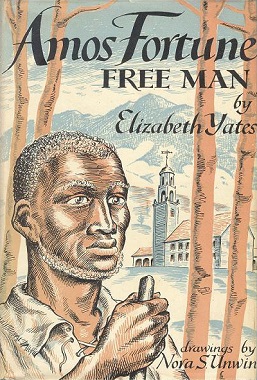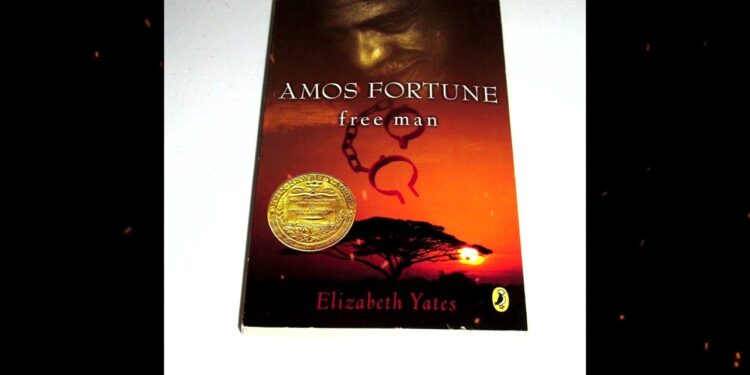Table of Contents
ToggleIntroduction
Amos Fortune, Free Man Summary By Elizabeth Yates Amos Fortune, Free Man is a historical novel written by Elizabeth Yates, first published in 1950. The novel is based on the true story of Amos Fortune, an African man who was born into slavery in Africa and eventually gained his freedom in colonial America. Through this inspiring narrative, Yates explores themes of perseverance, dignity, and the complex pursuit of freedom. Set in the 18th century, the novel offers a deeply human story of one man’s journey through hardship, the institution of slavery, and his eventual freedom, which allows him to live a life of self-determination and moral integrity.
The novel is structured in a way that is both accessible for young readers and deeply meaningful for adults, as it addresses significant themes about human dignity, personal growth, and the broader struggle for justice. It focuses on Amos Fortune, who was born in Africa, enslaved in the American colonies, and who, after years of hardship, won his freedom. The story follows his life through the various stages of his captivity and freedom, illustrating his inner strength, the choices he made, and his desire to live a life of righteousness and self-respect.
By telling the story of Amos Fortune, Yates introduces readers to a man whose dignity, courage, and moral convictions shaped his life in extraordinary ways. It is a story about the power of resilience and the importance of personal integrity, even when one is bound by the chains of slavery.
Summary of Amos Fortune, Free Man
The Early Life of Amos Fortune
The story of Amos Fortune, Free Man begins with Amos’ early years in his native land of Africa, specifically in what is now the country of Liberia. Amos was born into a wealthy and respected family, the son of a chief, in a time when African societies had their own established cultures, customs, and systems of governance. Amos’s life was initially one of privilege, and his family was well-regarded in the community. However, everything changed when Amos was kidnapped by slave traders at the age of fifteen.
The novel then shifts to Amos’ life as a captive. He is sold to American traders and shipped across the ocean to the American colonies, where he becomes a slave. He is bought by a wealthy man in Massachusetts, and as a young boy, he learns the cruel realities of slavery. In the beginning, Amos is a slave under harsh conditions, and he faces the constant fear of losing his humanity. The vivid descriptions of the brutalities that Amos and other slaves experience paint a painful picture of the system of slavery, especially in terms of its dehumanizing effects.
Read more
Amos Gains His Freedom
As the years pass, Amos’s resilience and inner strength help him to maintain a sense of dignity and purpose. After serving for many years as a slave, Amos is given the opportunity to buy his freedom. He is eventually able to raise the money needed by saving his earnings from work. His perseverance pays off, and Amos is granted freedom, but his journey doesn’t end there. Now, as a free man, he faces the challenges of building a life in a country where freedom for African Americans was rare, especially in the time of slavery.
Amos uses his new freedom to pursue a life of righteousness and integrity. He chooses to become a woodworker, a trade he learns while still a slave, and he sets out to make a life for himself in Jaffrey, New Hampshire. He becomes a respected member of the community, known for his work ethic, kindness, and honesty.

Amos’s Role as a Leader and Community Member
Throughout his life, Amos remains dedicated to principles of compassion, generosity, and justice. As a free man, he does not let his past shape his interactions with others in a negative way, but rather, he uses his experiences to help others. He is known for his deep faith and his strong belief in God, and he becomes a role model in his community, a symbol of resilience and strength. Even after achieving his personal freedom, Amos never forgets the plight of those still enslaved, and he works to help improve the lives of those around him.
Amos’s moral conviction, even in the face of the personal challenges he faces, makes him a powerful figure in his community. He remains active in helping others and is known for his generosity. Amos never forgets his roots, and despite being free, he works to raise awareness about the plight of other slaves, showing an ongoing commitment to the broader fight for equality and human rights.
In time, Amos marries a woman named Modesty, and together they have a family. His life is a testament to the power of family, community, and the belief that an individual can overcome the most difficult circumstances to create a meaningful life.
Themes in Amos Fortune, Free Man
1. Freedom and Personal Dignity
The most prominent theme in Amos Fortune, Free Man is the exploration of freedom—both as an external reality and as an internal condition. Freedom is not just about the physical emancipation from slavery but also about living with dignity and moral integrity. For Amos, freedom means more than just being free from chains. It means living according to one’s values, treating others with respect, and working for justice.
Read more
The novel shows that true freedom is not simply the absence of physical restraint; it is about creating a life where one’s mind and spirit are not enslaved by hate, fear, or bitterness. Amos represents this kind of freedom. Even though he was physically enslaved for many years, his mind and spirit were never fully subjugated. This distinction is crucial to the novel’s moral lesson about what it means to be truly free.
2. Perseverance and Resilience
Amos’s life story is a testament to the strength of human perseverance. Despite being born into slavery, suffering through the horrors of captivity, and facing racial discrimination in the colonies, Amos never loses his drive to improve his situation. His determination to rise above adversity, both emotionally and practically, highlights the importance of resilience in the face of overwhelming odds.
Throughout the novel, Amos never gives up on his dream of becoming free, and when he gains his freedom, he never takes it for granted. Instead, he uses his freedom to help others and make his community a better place. The message here is clear: true success is measured not by wealth or status but by the resilience one shows in the face of hardship and the positive impact one can have on others.
3. The Importance of Faith
Faith plays a significant role in Amos’s journey. As an enslaved person, Amos finds comfort and strength in his faith, and this spiritual conviction helps him survive the brutality of slavery. Once freed, he continues to live a life grounded in religious principles, demonstrating the power of faith to sustain an individual through the most difficult of circumstances.
His deep religious faith is not only a personal source of strength but also informs his actions and decisions. It compels him to treat others with kindness, respect, and justice. Amos’s unwavering belief in God’s purpose for his life helps him find meaning in his struggle for freedom and in his work as a woodworker and community leader. His faith is the foundation upon which he builds his new life.
4. The Importance of Education and Self-Improvement
Another theme in Amos Fortune, Free Man is the importance of education and self-improvement. Even as a slave, Amos is deeply committed to learning new skills and knowledge. He learns the craft of woodworking, which later enables him to earn a living after gaining his freedom.
The novel emphasizes that education is not just about acquiring book knowledge; it is also about developing the character and skills that allow individuals to better themselves and serve others. Through Amos’s example, Yates shows that education is one of the most powerful tools for empowerment, especially for those who have been oppressed.
5. The Legacy of Slavery and Social Justice
Although Amos has won his freedom, the novel does not shy away from the broader implications of slavery and the systemic injustices that continue to affect African Americans. Throughout the story, Amos’s past as a slave shapes his understanding of the world and his desire for justice. The novel emphasizes that the fight for freedom and equality is not over when one person becomes free—it is a collective struggle that continues through generations.
Amos’s actions are motivated by a deep sense of justice. He knows that his own freedom means nothing if it is not extended to others. His desire to see an end to slavery and to help those still enslaved is part of his broader vision for a just and fair world.

Conclusion
Amos Fortune, Free Man is a powerful historical novel that offers readers an inspiring and deeply moving portrait of a man who overcame unimaginable obstacles to live a life of freedom and dignity. Through the life of Amos Fortune, Elizabeth Yates brings to light important themes of perseverance, faith, justice, and the importance of community. The novel remains a timeless testament to the human spirit’s capacity for resilience, growth, and the pursuit of freedom, regardless of the external forces that seek to confine it.
Read more
(FAQ)
1. Who is Amos Fortune, and what is his significance in the novel?
Amos Fortune is the protagonist of the novel. He is an African man born into slavery who eventually gains his freedom and becomes a respected community leader. His significance lies in his remarkable perseverance and moral integrity, even in the face of adversity. His story highlights the importance of personal dignity, the power of faith, and the value of resilience.
2. How does Amos gain his freedom, and what does he do with it?
Amos gains his freedom after years of servitude by purchasing it with the money he saves. Once free, he chooses to live a life of self-respect, dedicating himself to the trade of woodworking. He uses his freedom to contribute to his community and help others, demonstrating that freedom is not just about individual autonomy but also about serving others and living a life of integrity.
3. What is the role of faith in Amos’s life?
Faith plays a central role in Amos’s life. It sustains him during his years in slavery and guides his actions as a free man. His deep belief in God’s purpose for him gives him strength to persevere through hardship, and it informs his sense of justice and kindness toward others.
4. What themes are explored in Amos Fortune, Free Man?
The novel explores several important themes, including freedom and personal dignity, perseverance and resilience, the importance of faith, education and self-improvement, and social justice. Through Amos’s life story, Yates examines how these themes intersect and shape an individual’s ability to overcome adversity and contribute to society.
5. Is Amos Fortune, Free Man based on a true story?
Yes, Amos Fortune, Free Man is based on the real-life story of Amos Fortune, a man born into slavery in Africa who later won his freedom and became a prominent figure in colonial New England. Yates fictionalizes parts of his life for the purposes of storytelling but stays true to his remarkable achievements.
















